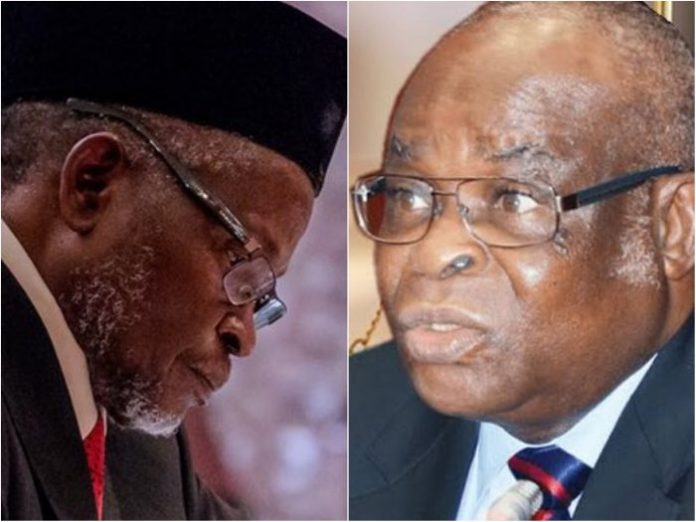Fresh Information has revealed that the National Judicial Council, NJC, may sack the former Chief Justice of Nigeria, Walter Onnoghen and the current one, Tanko Mohammed.
It will be recalled that President Buhari suspended Onnoghen and swore-in Mohammed as the new CJN, a move that has caused massive outcry as it violates the Nigerian Constitution.
The National Judicial Council (NJC) on Tuesday gave Onnoghen and Mohammed, a-week ultimatum to respond to the allegations of corruption and professional misconduct levelled against them.
Due to the gravity of the allegations, the NJC abridged the time and gave the accused persons one week instead of the usual 14 working days to respond to the allegations, an indication that they may be sacrificed to restore sanctity in the highly revered arm of government.
The council asked Onnoghen to explain why he did not declare all his assets and Mohammed why he submitted himself for appointment without the involvement of the NJC. The body, with the powers to discipline erring judicial officers, held the emergency meeting principally to consider petitions written against the two most senior judicial officers in the country.
As a result, former president of the Court of Appeal, Justice Umaru Abdullahi, was elected interim chairman to preside over the meeting. The next in rank at the Supreme Court, who incidentally is not a member of the NJC, Justice Olabode Rhodes-Vivour, could not be drafted into the meeting, since he may be the obvious beneficiary of the crisis.
If the council sanctions Onnoghen and Mohammed with dismissal, Rhodes-Vivour would automatically step in as the most senior justice of the Supreme Court and the NJC would recommend him to the president for appointment.
Perhaps the NJC had to abridge the time also because Justice Mohammed is occupying the office based on an interim order. Interim orders have short life spans. If the order expires, there will be the need for a fresh order to continue to keep him in office, as vacancy must be forestalled.
Constitutionally, anyone occupying the office of the CJN in acting capacity cannot be reappointed by the president if he fails to get the Senate confirmation at the expiration of three months and it is not likely the current Senate would confirm anyone not nominated by the NJC.
Section 231 (1) of the 1999 Constitution states: “The appointment of a person to the office of Chief Justice of Nigeria shall be made by the President on the recommendation of the National Judicial Council subject to confirmation of such appointment by the Senate.”
Subsection 4 provides that: “If the office of Chief Justice of Nigeria is vacant or if the person holding the office is for any reason unable to perform the functions of the office, then until a person has been appointed to and has assumed the functions of that office, or until the person holding has resumed those functions, the President shall appoint the most senior Justice of the Supreme Court to perform those functions.”
Subsection 5, however, provides that “Except on the recommendation of the National Judicial Council, an appointment pursuant to the provisions of subsection (4) of this section shall cease to have effect after the expiration of three months from the date of such appointment, and the President shall not re-appoint a person whose appointment has lapsed.”
Mohammed’s appointment by the president happened when there was no vacancy for the office. In the petition against Onnogen, a civil society group, Resource Centre for Human Rights & Civil Education had accused him of non-declaration of his assets as required by law for public officers. He was charged with the offence at the Code of Conduct Tribunal (CCT). This resulted in President Muhammadu Buhari suspending him and swearing in Mohammed in his place.
